Current as of: February 21, 2026 - 12:23
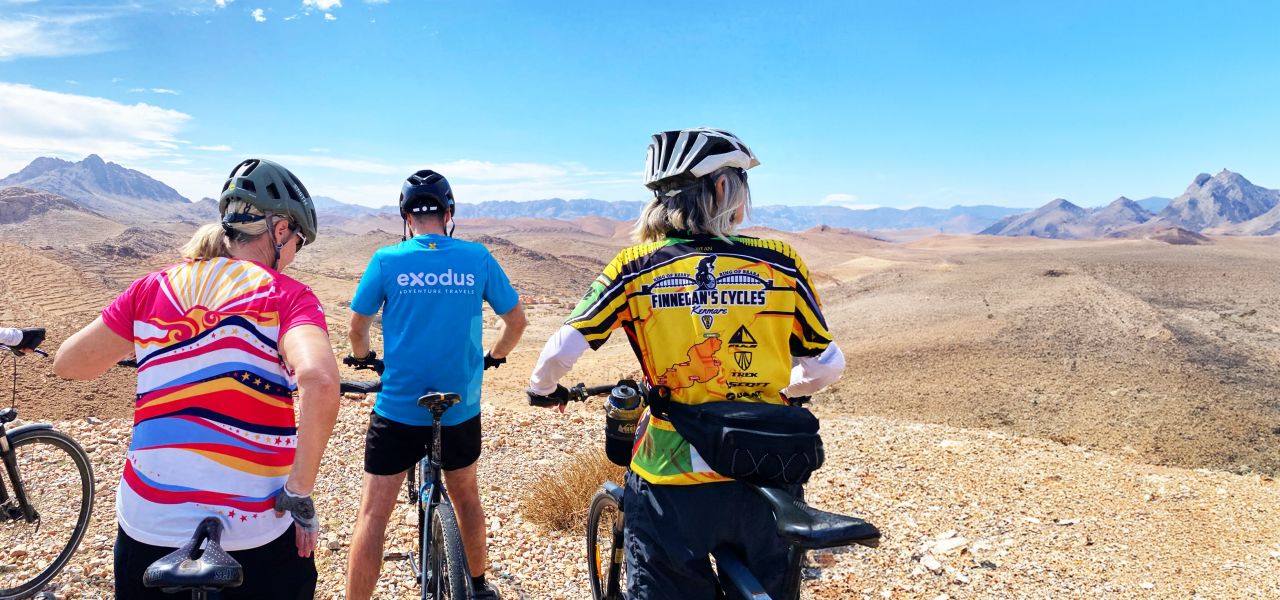
Cycle Morocco's Great South Trip Notes
- Ways to Travel: Guided Group
- Destination: Morocco
- Programmes: Cycling
-
Activity Level:
5 out of 7 - Challenging
- 9 Days: Land Only
- Ages: 16+
- Trip Code: MMI
- Carbon Footprint: 32kg CO2e
Trip Overview
Pedal through remote villages and the rugged Atlas Mountains
Encompassing the best of Morocco, this trip will take us past the foothills of Mount Toubkal, golden kasbahs, impressive gorges and the long sandy beach of Essaouira. This spectacular route follows smooth paved roads and climbs over high mountain passes that reward you with spectacular vistas of the High Atlas Mountains. A real highlight is riding through Paradise Valley, close to Imouzzer, where a palm-filled valley leads to a high pass with views down to the ocean below.
Highlights
- Cycle from the Atlas Mountains to Essaouira beach, experiencing the best of Morocco en route
- Ride along the foothill of Toubkal, the highest mountain in North Africa
- Conquer the dramatic Tizi n’Test Pass for dramatic views over the Sousse Valley
- Explore the seaside city of Essaouira, staying overnight in a traditional riad
- End the adventure in pulsating Marrakech
Is This Trip for You?
This tour is classified Road and Activity Level 5 (Challenging). For more information on our trips gradings please visit the Activity Level Guidelines page. If you have any queries about the difficulty of the trip please do not hesitate to contact us.
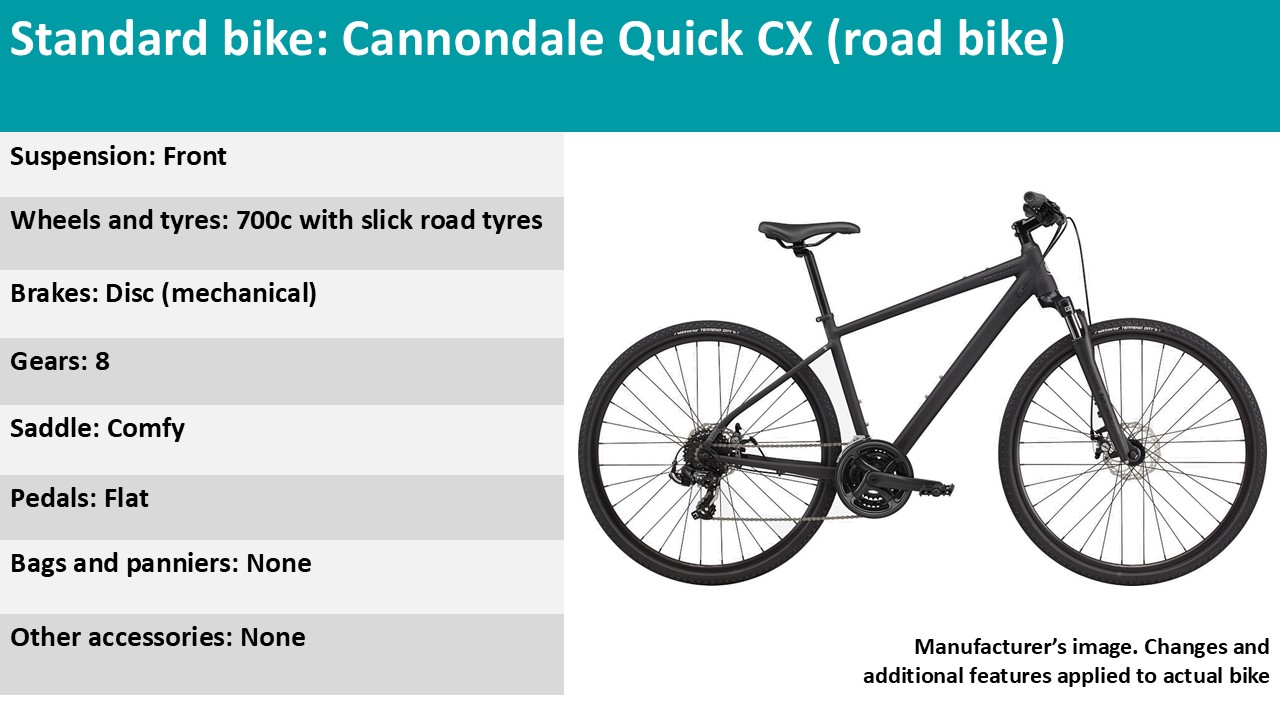
Terrain and route: 90 percent paved, 10 percent unsurfaced road with an average daily distance of 42mi (68km).
Fitness: A good level of fitness is required for this trip as there are some climbs, with 13mi (21km) as the longest.
Rides: Mostly undulating with several optional long climbs and fast descents. There is ongoing road development in Morocco and the quality of the surface improves every year. However, there may be some sections on rough or dirt tracks and for that reason we don’t currently recommend the use of drop bar road bikes on this trip.
Journeys: Morocco is stunning but large and the cities and country areas are spread out. This means there are sometimes long journeys when we are not cycling but this is the only way to see all the country offers. We are not confined to our vehicle though, as there are plenty of photo stops and opportunities to stretch your legs. The approximate drive times are noted on the daily itinerary.
Climate: The temperatures in Morocco are hot in the summer months but we try to make the most of the coolest parts of the day. It is usually milder in the south. Morocco can get cold in the winter months though usually daytime temperatures are mild. It is advisable to pack winter clothes for November through to March when nighttime temperatures especially in the desert and the mountains can drop considerably. During these months there can also be rain throughout the country and snow in the mountains. As Morocco is generally mild to hot it is not set up for colder temperatures and so there may not be heaters available. Please pack winter clothes and nightwear to ensure you are comfortable. Of course you can also ask for more blankets from the hotels. Please be prepared for the colder months.
Ramadan: The holy month of Ramadan is expected to run from 17 February to 19 March 2026. One of the most important periods in the Islamic calendar, it is a special time to visit a Muslim country. Our tour leaders and drivers choose to work at this time so we continue to run trips; however, their energy levels may be slightly lower than normal. Many tourist sites, restaurants and shops run an amended schedule, but your tour leader knows how to adapt the itinerary to experience all the inclusions on this trip and maximise your experience during this special time.
Eid al-Adha: The Eid al-Adha celebration runs from 26-30 May 2026. Some businesses may close or run an amended schedule during this period.
Water: It is advisable to only brush teeth with bottled/boiled water and to avoid salads washed with tap water.
Group
Normally 4 to 16, plus leader and drivers.
Adult min age: 16
Min group size: 5
Max group size: 16
Itinerary
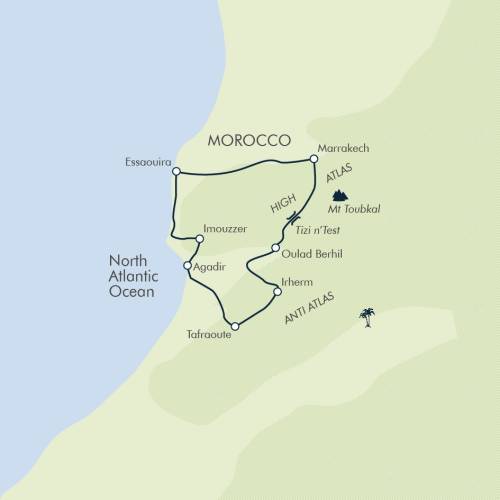
Land Only
- Start City: Marrakech
- End City: Marrakech
Land Only Itinerary

Buzzy Marrakech is a whirlwind of tradition and culture, an invigorating introduction to Morocco. If you arrive with time to explore we recommend walking around the old walled medina where winding alleyways are filled with souks selling everything from street food to herbs, spices and pottery.
Usually around 6pm, you’ll say hello to your tour leader and fellow travellers at the hotel, where we gather as a group for the first time to get to know each other and learn more about the adventures ahead.
Your tour leader then ensures a big Moroccan welcome over a group dinner together.
Want to explore further? Secure pre-tour nights through your sales representative.
Accommodation: Hotel Meriem (or similar)
We transfer out of Marrakech this morning to Sid Fares and begin our cycling journey into the foothills of Mount Toubkal. After a nice warm up on a wonderful, undulating road, we enjoy a long descent into the Asni Valley with beautiful views. We then follow the river and cross several bridges before arriving at our hotel.
Accommodation: Auberge Tigmmi n'Tamazirte (or similar)
The day begins with a challenging climb to the dramatic Tizi n’Test Pass (6,890ft/2,100m). We are rewarded with dramatic views to the south over the Sousse Valley towards the Anti Atlas Mountains. After lunch, we have a truly dramatic and, in places, quite steep descent as the road winds down to the valley. Once in the valley, our ride takes us past orange, lemon and grapefruit groves as we approach Oulad Berhil. Here we receive a warm welcome, delicious food and a relaxing evening at our beautiful riad. This converted palace is a wonderful addition to the end of our day with roaming peacocks and the chance to pick our own fruit straight off the trees.
Accommodation: Riad Hida/Hotel l’Arganier (or similar)

We have a morning transfer into the Anti Atlas Mountains and the real southern Morocco, much of which is semi-desert and a contrast to the fertile Sousse Valley. We travel through argan country trying to spot the much-loved tree-climbing goats. From Irherm, we are surrounded by almond trees and our road has some wonderful ups and downs as we pass through many farms and mud-walled Amazigh villages. The last section of the ride is another wonderful descent of about 7.5mi (12km) through dramatic scenery to Tafraoute.
Time permitting, we visit peculiar painted-blue giant rocks, otherwise we visit tomorrow.
Accommodation: Hotel les Amandiers (or similar)

We transfer to Tizi M’Lil and begin another varied ride, undulating through spectacular hills, past traditional villages and hill-top kasbahs, with some superb balcony sections with excellent views. There are a few climbs, but the ride ends with an exhilarating descent to Ait Baha Lake and then we transfer to the coastal resort of Agadir.
Accommodation: Oasis Hotel & Spa (or similar)

Today we enjoy a truly spectacular ride through the Paradise Valley, a narrow gorge lined with palm trees. Towards the head of the valley, we have another challenging climb with excellent views, eventually reaching a high plateau and the little town of Imouzzer, the end point of one of the most dramatic rides on our route. Originally the home of the Ida Outanane Amazigh tribe, Imouzzer retains a strong cultural identity.
Accommodation: Hotel des Cascades Ecolodge (or similar)
We start cycling from the front door and begin with another excellent winding descent on a good road to a valley dotted with palm trees and traditional villages. There are a couple of moderate climbs over rocky hills and descents back into the fertile valleys before we reach the main coast road and the end of the ride. After a picnic lunch, we transfer (90 minutes) to our destination for the evening, Essaouira. This old Portuguese fishing port dates to the 15th century, but the present town was constructed around 1760 by Sidi Mohammed ben Abdullah, who needed a base from which to suppress a revolt from Agadir. Today, Essaouira is extremely relaxed and the whitewashed houses with painted shutters, artisan workshops, boatyards and fishermen provide a marked contrast to Marrakech. There’s plenty of interest in the narrow traffic-free streets of the old town and we stay overnight in a traditional riad.
Accommodation: Riad Benatar or Riad Al Medina (or similar)

After a free morning to explore lovely Essaouira, we transfer to the vibrant city of Marrakech. Simply enjoy a freshly squeezed orange juice in one of the many rooftop cafes overlooking the Djemma El Fna square, or perhaps take a calèche (a horse-drawn carriage) ride to the peaceful Majorelle Gardens. These small but tranquil gardens are decorated throughout in indigo blue and house the small Museum of Islamic Art. A final treat would be to go for a hammam, a traditional Moroccan steam bath. A visit to Djemma el Fna this evening is the ultimate reward for our week’s cycling – with story tellers, smoky food stalls and souks, there is no other way to experience the exciting atmosphere of Marrakech.
Accommodation: Hotel Meriem (or similar)
Enjoy your final breakfast this morning and take the chance to reflect on your unforgettable Morocco adventure before you start your return journey. Alternatively, if you would like to extend your time in Morocco please speak to your sales representative who will be happy to advise.
Extend Your Trip
Marrakech Hotels & Riads
A city of vibrant souks, ornate palaces and fragrant gardens, where ancient traditions meet modern energy. Extra nights here give you time to wander the medina, relax in hidden courtyards and soak up the city’s atmosphere at your own pace. Here are a few of our favourite hotels to inspire your stay:
Kenzi Rose Garden: Set within expansive landscaped gardens in Marrakech’s Hivernage district, this comfortable hotel offers a peaceful retreat close to the city’s main attractions. With multiple pools, spacious rooms and a relaxed atmosphere, it’s an ideal base for unwinding after exploring the medina.
Riad Moullaoud: Tucked away in the heart of the medina, this traditional riad offers an intimate and authentic Moroccan experience. Centred around a tranquil courtyard with a small pool and rooftop terrace, it’s perfect for travellers wanting charm, character and easy access to Marrakech’s souks.
Es Saadi Marrakech Resort: Located in the upscale Hivernage area, this stylish resort combines luxury accommodation with lush gardens, art-filled interiors and excellent dining. With a large spa, pools and views towards the Atlas Mountains, it offers a refined and relaxing end to your adventure.
This is just a glimpse of what’s possible. Speak to your sales representative, who can guide you through the options and arrange everything for you.
Accommodation
Moroccan hotels, riads and auberge
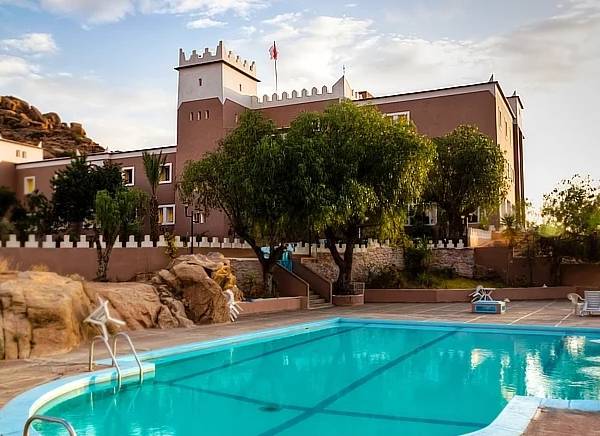
We stay in hotels, an auberge and two riads during this trip. Apart from the auberge, these are three- and four-star properties (local ratings). Below are some of the places we typically stay.
Tafraoute: Hotel les Amandiers
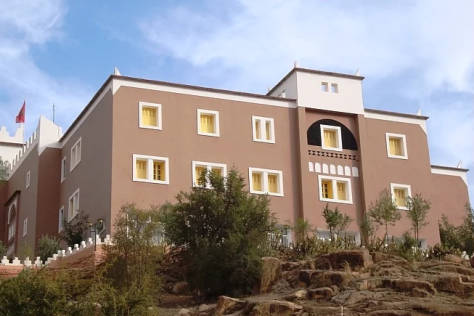
Perched on a rocky hillock, Les Amandiers overlooks the valley and is surrounded by pink granite mountains. The property has a pool with mountain views and a lounge where you can relax.
Imouzzer: Hotel des Cascades Ecolodge
After one of our most spectacular rides of the trip, Hotel des Cascades is the perfect place to unwind and reminisce. There’s an outdoor pool for a post-cycle dip and sun loungers if you just want to kickback. Best of all, however, might be the views, which stretch over the surrounding Atlas peaks.
Essaouira: Riad Al Madina
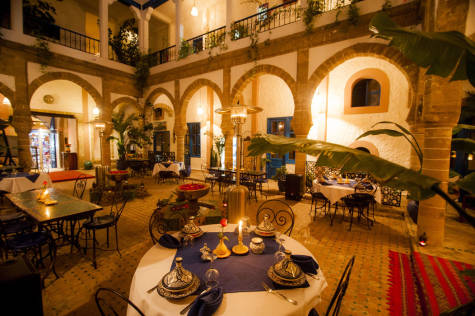
Built in 1817, this traditional riad in Essaouira medina provides an authentic look into a bygone age. The hub of social interaction is the patio, but you can also enjoy Moroccan tea in one of the lounges. When you’re ready to explore, the beach is just 655ft (200m) away and you’re near all the attractions and souks.
Worth knowing
- A single supplement is available; however, this does not apply to the night spent at Auberge Tigmmi (Day 2).
About riads
Riads are traditional Moroccan homes, generally in the old part of the city or medina, where the wealthiest people would historically live. They’re typically built around a central corridor with windows facing an internal courtyard (external windows are rare). Most have a rooftop terrace where breakfast is served. A night in a riad is an authentic Moroccan experience; however, riads do not have hotel-style facilities. Additionally, the rooms are not standardised and come in different sizes and shapes.
Single supplement from USD 345
Food & Drink
Moroccan food is excellent, though not particularly varied. Breakfasts usually consist of bread, and jam with tea or coffee. Lunches are a mixture of packed lunches or eating in a local restaurant. They are generally a mixture of bread, pasta, rice, vegetables, cheese, fish, ham and fruit.
Where meals are not included budget for the following approximate prices.
Lunches: 60 to 100 Dirham (US$6-10) Dinners: In cities 80 to 200 Dirham (US$8-19) and in small towns villages 60 – 100 Dirham (US$6-10)
Soft drinks in restaurants : 10 to 20 Dirham (US$1-1.90) Alcohol: Beer 30 to 50 Dirham (US$2.85-5)– Wine 150 Dirham (US$14) and more
Vegetarians can be catered for but there is a fairly limited choice of vegetarian couscous, tajine or omelettes. This is particularly the case during the more rural sections of the trip. Please note that if you have any special dietary requirements you should inform the Exodus Office prior to the trip. If you have a specific medical/dietary need (e.g. coeliac or vegan) you may find it helpful to bring some food with you from home.
Transport
All luggage will be carried by the support vehicles (long-wheelbase four-wheel drives), which will be following the group all the time. You may ride as much or as little as you like. The only things you need carry with you on the bike are your valuables, sunscreen, camera and water bottle.
Weather & Seasonality
Mountains can make their own weather, so we may occasionally be forced to amend the itinerary for part of the trip. On the plains, the days are usually warm to hot (above 25C/77F) but the nights are cooler. In the higher areas and the mountains, days should be warm or even hot in October and April, with clear skies, but the nights are often cold (sometimes around 7C/45F). On the high ridges of the High Atlas there can be snow, but not normally enough to affect the areas in which we cycle; if a road is closed, we will arrange a suitable alternative ride. Rainfall in the areas we visit is relatively low though there is a chance of rain, particularly on trips in December, January and February. Although unusual, there is also the possibility of much colder weather during these months and into the beginning of March.
Joining Instructions
Key information
Start hotel: 154 Med El Beqal, Marrakesh 40000
Phone: +212 5244-37062
Recommended arrival time: You can arrive at any time today, but we recommend flights that land around midday to ensure you can pass through security and get into the city in good time before our welcome briefing at 6pm. Hotel check-in is from 2pm.
Airport: Marrakech Menara Airport (RAK)
Getting to the start hotel
The start hotel is approximately a 20-minute drive from the airport. Exodus provides free arrival transfers to the start hotel from the airport for all customers.
If you would like further information on joining this trip, please speak to your sales representative.
Catching your return flight
We provide free departure transfers for all customers to Marrakech Airport (RAK) from the end hotel. If you’re not taking the transfer, allow three hours for check in, bag drop, immigration and security.
Please note, unless specified otherwise, the transfers will be to the start (or pre-tour) hotel and from the end (or post-tour) hotel and will be on the date on which the tour starts/ends; transfers to other hotels in the same city and/or on different dates may attract an extra charge. Transfers should be booked with your sales representative at least two weeks before the tour starts.
Marrakech airport
The amount of time it takes to get through Marrakech Airport can vary considerably. Therefore, we suggest you mitigate for delays and allow two hours to get through immigration, security and baggage reclaim on arrival. Take a pen with you to complete the arrivals form and have the details of your accommodation to hand for this purpose. Operators are not allowed to wait inside the terminal building for clients, so please find your Exodus representative outside the main doors.
Upon departure from Marrakech, we suggest allowing three hours to navigate the airport: check in, bag drop, immigration and security can take even longer on exit. The airport doesn’t accept mobile boarding passes, so we suggest having a printed boarding pass to avoid subjecting yourself to further delays.
Full joining instructions including local emergency numbers will be sent to you as part of our Final Joining Instructions. If you do not receive these at least a week before departure, or require them earlier please contact our office or your travel agent.
Location start: Marrakech
Location end: Marrakech
What To Take
Essential Equipment
- Normal daily clothes
- Warmer layers (for the earlier departures)
- Sunscreen
- Water bottle or Camelbak
Please note, it can get cold in several hotels at night in spring/autumn and you may wish to have warm clothes to sleep in.
Water included: Plastic bottles are a big issue in many countries where recycling isn’t yet widely available; they often end up in landfill or get burned. Both processes are harmful to the environment and we would like to reduce our impact here. For your trip, we provide an alternative to single-use plastic bottles to reduce the plastic used. This means that safe drinking water will be available throughout; all you need to do is bring a bottle to refill along the way. Please add this to your packing list.
Equipment Hire
Included standard bike
The standard bike for this trip is a Road Bike The new Cannondale Quick CX.
We will take your height at the time of booking to reserve equipment. If you have a preferred bike size, please request when booking.
E-bike upgrade
Electric bikes are available on this trip; prices from £200/US$252/$344 CAD. Speak to your sales representative for more information. Please note these prices are correct at time of writing. Currency rates could fluctuate.
Bringing your own bike
If you’d prefer to bring your own bike, please advise us at the time of booking and you will receive a discount on the price of the trip. However, you will be responsible for any extra baggage charges; assembling and disassembling your bike; and bringing along spare parts and any tools specific to it. You should also ensure you have adequate insurance to cover loss, damage or theft.
Accessories and clothing
Bringing equipment from home
You’re welcome to bring your own equipment, such as SPD pedals or clipless pedals, your own saddle (excluding the seat post), or gel saddle cover for the hire bikes. Your leader will help you fit these when bikes are distributed.
Helmets
Helmets are mandatory for everyone on a guided Exodus cycling trip. You must bring your own as, following best safety practice, they are not available for hire.
Cycling clothing
For all cycling trips we recommend:
- Padded cycling shorts: For destinations with more modest cultures, we also recommend loose ‘over-shorts’ for riding or rest stops
- Eyewear: Either sunglasses or eye protection with clear lenses to protect the eyes while riding
- Cycling gloves: Especially for riding off-road or on rugged surfaces
- Cycling shoes: Cycling is more efficient with stiff-soled shoes. We don’t recommend open-toed shoes or sandals
- Small close-fitting backpack or bum bag (fanny pack): To keep spare clothing or essential items to hand during the ride
- Waterproofs and long cycling trousers
- Energy gels/snacks
Practical Information
Visa
Morocco
Travellers from the UK, US and EU normally do not need a visa to enter Morocco. Please note, visa requirements often change and it is your responsibility to obtain any required visas for this trip. Therefore, we recommend that you check with the nearest embassy or consulate of your chosen destination(s), including any countries you may be transiting or transferring through.
Some local governments provide guidance on what visas their citizens need. To help, we’ve gathered a selection of useful links below.
• Australia: www.smartraveller.gov.au/destinations/africa/morocco
• Canada: www.travel.gc.ca/destinations/morocco
• United Kingdom: www.gov.uk/foreign-travel-advice/morocco/entry-requirements
• USA: www.travel.state.gov/content/travel/en/international-travel/International-Travel-Country-Information-Pages/Morocco.html
Vaccinations and Health
Morocco
There are no required vaccinations. However, you may want to consider vaccinations for tetanus, hepatitis A, hepatitis B, rabies, tuberculosis and typhoid. A polio vaccination certificate may be required for some travellers. Please confirm your needs and requirements with your doctor or travel clinic.
The Travel Health Pro website recommends to have a rabies vaccination on this trip, as cycling is considered a higher risk activity.
Local Time
Morocco's time zone: Africa/Casablanca (UTC +00:00)
Electricity
Morocco's electricity: Plug types C (two round pins, European standard) and E (two round pins) – 220V, 50Hz
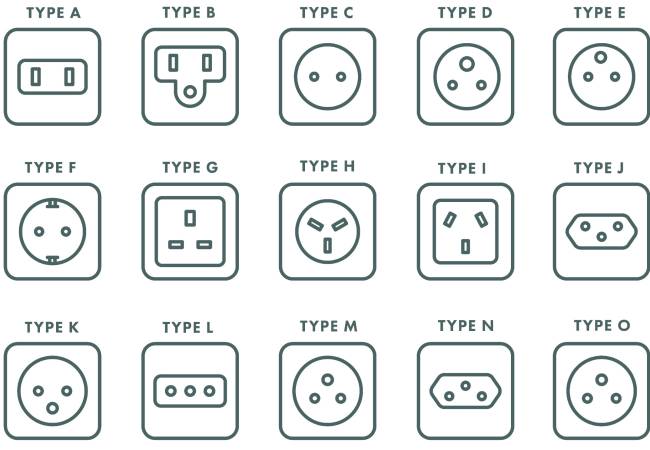
Money
Morocco's currency: Moroccan dirham (MAD), a non-convertible currency. You can only import/export a maximum of 2,000 dirham to or from Morocco.
ATM Availability
ATMs are widely available in the larger towns and cities, less so in the countryside. Credit cards are normally accepted for more expensive souvenirs, such as carpets (but shops may charge a five percent supplement for this). We don’t recommend travellers cheques as few banks now accept them.
Extra Expenses & Spending Money
We suggest you take your personal spending money in good condition notes, either in US dollars, British pounds or euros. Euro cheques are not accepted in Morocco. No Moroccan currency may be imported or exported. There is no limit on the amount of foreign currency that may be imported provided it is declared on arrival. When changing your money, ensure you keep your exchange receipt as you may need to show it at the airport bank at the end of your holiday where it is possible to exchange any unspent dirham notes.
At the start of the trip, the leader will ask for contributions towards a kitty – approximately 300 Moroccan dirhams (US$28) – to cover drinks, snacks and other expenses.
Tipping
Our local staff are paid fairly for their work. However, tipping is part of the local culture and generally expected. While tipping is at your discretion, our groups typically ask for advice on how much to give. Below are some recommendations:
Tipping kitty: We have found it useful for the group to have a kitty – about 550 dirhams (US$60) per person – to ease the confusion and embarrassment around tipping local staff (cooks, guides, hotel staff etc). If you do not wish to join the group kitty, do not feel pressured.
Tour leader and driver: Many also wish to tip the tour leader and driver at the end of the trip; we suggest 55-90 di rhams (US$6-US$10) a day per person for the tour leader and 20-35 dirhams (US$2-US$4) a day per person for the driver. This is completely at your own discretion and to be used as a guideline only.
Sustainability and Impact
As a certified B Corp, we’re on a mission to improve our social and environmental impact across all our adventures.
We do this through our innovative Thriving Nature, Thriving People plan.
This ‘nature positive’ approach is designed to help nature and communities thrive in harmony through practical solutions, such as reducing carbon and waste on our trips, supporting conservation projects through the Exodus Adventure Travels Foundation, and rewilding 100 square metres for every Exodus traveller.
Important Information
Your Safe Participation
When booking this trip, you should be confident in your ability to participate in all activities described in these Trip Notes. If you have any doubt about your suitability, please call us and ask to speak to one of the experts on this itinerary.
Although our leaders are well trained to deal with different capabilities, if they have any concerns about someone’s ability to safely take part in an activity, or their impact on other people’s enjoyment, we authorise them to take necessary action which, in some circumstances, may involve asking someone to miss that activity.
By booking this trip you agree to our Booking Conditions which clearly state that our leaders have the authority to do this. In these rare instances we will ensure anyone sitting out is safely provided for and offered alternative options where possible. Refunds will not be provided for activities missed and customers may be liable for additional costs incurred.
Seatbelts
All vehicles used by us should be equipped with working seatbelts, except where approved by us based on the vehicle type or journey. Wherever seatbelts are available, we require our customers to use them for their own safety, even where it may not be a legal requirement.
Travel Safety
For additional information please have a look at the travel safety advice page on our website.
How to Book
Speak to our friendly team of experts to plan your adventure:
- Check availability: our website shows real-time availability of our guided group tours, or contact our team by phone, email or live chat.
- Hold a space: You can provisionally hold a space on any guided group tour to give you time to finalise your travel plans.
- Confirm your booking: Payment of a deposit will complete your booking and secure your place on the trip.
After booking
You will receive a confirmation document and invoice, which includes extra information and guidance about your travel arrangements. Our dedicated Customer Operations team will help you with any pre-travel questions or arrangements and can easily add extensions or extra accommodation to your booking. Final Joining Instructions will usually be sent out two to three weeks prior to departure.
Adding transfers to your booking
If you have arranged your own flights and would like to add transfers to your booking, please provide your arrival and departure details to our Customer Operations team around four to six weeks before departure.
- Where free transfers are included, they are available for any flight but can only be added to your booking once we have received your flight schedule.
- Where group arrival and departure transfers are available, these operate at fixed times. You will need to arrive in time to meet the scheduled transfer. If the timings don’t align with your travel plans, our team can arrange private transfers once they receive your flight schedule.
Trip Note validity
Trip notes may be updated after booking; if any updates significantly impact the inclusions or itinerary you will be advised in writing. A link to the most up-to-date Trip Notes will be sent out with your Final Joining Instructions before departure.
The information in these Trip Notes is given in good faith. All holidays can be subject to unexpected changes, and occasionally it may not be possible to follow the itinerary as planned. In these circumstances we will make the best-possible alternative arrangements that maintain the integrity of the original itinerary.

